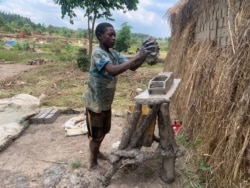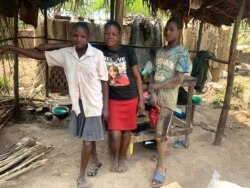Fourteen-year-old Ugandan Musa Ssewanyana has mastered the art of brick-laying, but he should be in high school – laying the foundation of his education.
However, since Uganda closed schools in March to contain the spread of the novel coronavirus, Ssewanyana has few options.
He says during this school break, he is still reading his books. And if the family has money, he adds, they switch on the TV to follow the teachings.
Unlike families who are financially able to study online, Ssewanyana’s family doesn't have electricity and cannot always afford the $3 per day subscription or the power needed to watch lessons on state TV.
His mother, Nayigga Rashidah, says the past five months have been difficult with her three children at home.
She says she bought them a new television set knowing they would use it to study, but there are times when even the solar battery doesn’t charge and the television turns off.
The Ugandan government vowed to buy televisions and radios for poor communities with schoolchildren, but has yet to act. And a $150 million July World Bank grant is expected soon to help provide learning materials for students nationwide.
But Uganda’s Acting Director of Basic Education Mulindwa Ismail says the damage is already done, including to school properties that were sold off or sitting vacant.
“The chairs ... some of them are eaten by ants. So, by the time we reopen schools we may need now to replenish … to buy another set of furniture,” he said. “But that said, loss of jobs for our teachers and what, losing property. But even losing our learners. We are worried a sizable percentage may not come back to school.”
Education charity groups like Uwezo, which means “capability” in Kiswahili, say COVID-19 has caused both a health and education crisis.
When schools eventually reopen, says Uwezo’s Executive Director Mary Goretti Nakabugo, children will have to make up for lost time.
“The starting point will be to try and give a simple assessment to understand the level at which each of these kids is at,” Nakabugo said. “Otherwise, if you take them as a whole, many of them are going to be left behind. And the ones who are going to be left behind are mainly the ones in the low-income families.”
Meanwhile, Uganda’s Ministry of Education is planning a campaign aimed at parents to encourage home schooling.














